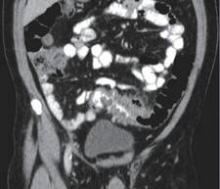The American Gastroenterological Association (AGA) has announced new guidelines for the management of acute diverticulitis, the first practice guidelines for the disease since 1999, and they appear in the December issue of Gastroenterology.
“The management of acute diverticulitis has undergone meaningful change over the past decade, including a more judicious use of antibiotics and surgery, as well as preliminary and ongoing investigations into medical therapies to decrease symptoms and reduce recurrences,” the AGA noted. “The majority of the evidence currently, however, is of poor quality, and most of our recommendations are therefore conditional.”
The guidelines strongly recommend that patients not use mesalamine after acute uncomplicated diverticulitis, citing “moderate” evidence to this effect and saying that currently available evidence regarding the anti-inflammatory agent often used for ulcerative colitis “does not suggest efficacy in reducing recurrence risk, pain resolution, or need for surgery in this specific population.” All other recommendations, however, are conditional and offer either “low-” or “very low-quality” evidence to support them.
These additional recommendations include the following:
• Antibiotics should be used selectively, rather than routinely, in patients with acute uncomplicated diverticulitis.
• Colonoscopy should be performed after resolution of acute uncomplicated diverticulitis in appropriate candidates to exclude the misdiagnosis of a colonic neoplasm, if a high-quality exam of the colon has not been recently performed.
• Patients with a history of diverticulitis should consume a fiber-rich diet or consider fiber supplementation.
• Patients with diverticular disease should consider vigorous physical activity.
The AGA recommendations also advise against certain practices, all with conditional application and either “low-” or “very low-quality” supportive evidence. These are as follows:
• Elective colonic resection should not be done in patients with an initial episode of acute, uncomplicated diverticulitis; the decision to perform elective prophylactic colonic resection in this setting should be individualized.
• Patients with a history of diverticulitis should not be advised to avoid consumption of seeds, nuts, and popcorn.
• Patients with a history of diverticulitis should not be advised to avoid the use of aspirin.
• Patients with a history of diverticulitis should not be advised to avoid the use of nonselective nonsteroidal anti-inflammatory drugs.
• Do not advise the use of mesalamine after acute uncomplicated diverticulitis.
• Do not advise the use of rifaximin after acute uncomplicated diverticulitis.
• Do not advise the use of probiotics after acute uncomplicated diverticulitis.
“Acute diverticulitis is the third most common inpatient gastrointestinal diagnosis in the United States, costing over $2 billion annually, and is a common outpatient and emergency department diagnosis as well,” stated the AGA recommendations, which were developed by the AGA’s Clinical Guidelines Committee and approved by the AGA Institute Governing Board.
The statement notes that the condition “occurs in approximately 4% of patients with diverticulosis, roughly 15% of whom will have complicated disease, defined as an abscess, perforation, fistula or colon obstruction, and 15%-30% will experience recurrence.”
The new guidelines do not address other forms of diverticular disease, including symptomatic uncomplicated diverticular disease, diverticular bleeding, and segmental colitis associated with diverticulosis. It does not address the prevention of incident diverticulitis or the management of complicated disease.
Areas of further research, advises the AGA, should be in identifying patients who will benefit the most from antibiotics, identifying those in whom antibiotics can be withheld safely, identifying risk factors for recurrent diverticulitis, examining the risks of colonoscopy following acute diverticulitis, and taking a closer looks at anti-inflammatory drugs, antibiotics, probiotics, and dietary interventions as viable therapies.


